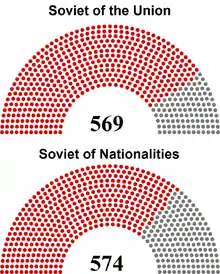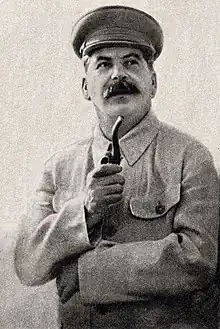1937 Soviet Union legislative election
Elections to the Supreme Soviet were held in the Soviet Union on 12 December 1937.[1] It was the first election held under the 1936 Soviet Constitution, which had formed the Supreme Soviet of the Soviet Union to replace the old legislature, the Congress of Soviets of the Soviet Union.
| |||||||||||||||||||
All 1,143 seats in the Supreme Soviet | |||||||||||||||||||
|---|---|---|---|---|---|---|---|---|---|---|---|---|---|---|---|---|---|---|---|
| |||||||||||||||||||
| |||||||||||||||||||
Electoral system
The elections were originally announced as being multi-candidate; however, by halfway through the year the announcement was reversed due to the leadership worrying about the possible emergence of political opposition.[2] However, during that early period a number of individuals attempted to hold the government to the multi-candidate promise, including members of the Russian Orthodox Church who attempted to field religious candidates as a result of Article 134[3] of the new constitution, which promised freedom of religion. Many of the early individuals attempting to run as alternate candidates were arrested after the decision for multiple candidates was reversed. Additionally, the NKVD conducted mass arrests shortly before the elections.[4]
Conduct
Despite the mass arrests and with the tone more subdued than with elections held in 1929, there were still minor waves of dissent and opposition to candidates, especially major political figures (including Mikhail Kalinin, Anastas Mikoyan, and even Joseph Stalin himself) as well as celebrities (such as Aleksei Tolstoy) and candidates opposed on the basis of ethnicity (such as ethnic Russians running in the Ukrainian SSR).[4]
Results

Soviet of the Union
| Party | Votes | % | Seats | |
|---|---|---|---|---|
| All-Union Communist Party (Bolsheviks) | 89,844,271 | 99.30 | 461 | |
| Independents | 108 | |||
| Against | 632,074 | 0.70 | – | |
| Total | 90,476,345 | 100.00 | 569 | |
| Valid votes | 90,476,345 | 99.30 | ||
| Invalid/blank votes | 636,808 | 0.70 | ||
| Total votes | 91,113,153 | 100.00 | ||
| Registered voters/turnout | 94,138,159 | 96.79 | ||
| Source: Nohlen & Stöver | ||||
Soviet of Nationalities
| Party | Votes | % | Seats | |
|---|---|---|---|---|
| All-Union Communist Party (Bolsheviks) | 89,063,169 | 99.37 | 409 | |
| Independents | 165 | |||
| Against | 562,402 | 0.63 | – | |
| Total | 89,625,571 | 100.00 | 574 | |
| Valid votes | 89,625,571 | 98.37 | ||
| Invalid/blank votes | 1,487,582 | 1.63 | ||
| Total votes | 91,113,153 | 100.00 | ||
| Registered voters/turnout | 94,138,159 | 96.79 | ||
| Source: Nohlen & Stöver | ||||
References
- Dieter Nohlen & Philip Stöver (2010) Elections in Europe: A data handbook, p1642 ISBN 978-3-8329-5609-7
- "Open Library" (PDF). Archived from the original (PDF) on 2022-12-16. Retrieved 2022-12-05.
- "Constitution (Fundamental law) of the Union of Soviet Socialist Republics". Constitution (Fundamental law) of the Union of Soviet Socialist Republics. Red Star Press Ltd., London, 1978. Retrieved 1 September 2019.
ARTICLE 134. Member s of all Soviets of Working People's Deputies - of the Supreme Soviet of the U.S.S.R., the Supreme Soviets of the Union Republics, the Soviets of Working People's Deputies of the Territories and Regions, the Supreme Soviets of the Autonomous Republics, the Soviets of Working People's Deputies of Autonomous Regions, area, district, city and rural (stanitsa, village, hamlet, kishlak, aul) Soviets of Working People's Deputies - are chosen by the electors on the basis of universal, direct and equal suffrage by secret ballot.
- Fitzpatrick, Sheila. 1999. Everyday Stalinism: Ordinary Life in Extraordinary Times: Soviet Russia in the 1930s. New York: Oxford University Press, pp. 179–182.
External sources
- "State and Society Under Stalin: Constitutions and Elections in the 1930s," article by J. Arch Getty in Slavic Review, Vol. 50, No. 1 (Spring, 1991).
- The Distinctiveness of Soviet Law. Ferdinand Joseph Maria Feldbrugge, ed. Martinus Nijhoff Publishers: Dordrecht (1987): 110-112.
- Fitzpatrick, Sheila. 1999. Everyday Stalinism: Ordinary Life in Extraordinary Times: Soviet Russia in the 1930s. New York: Oxford University Press, pp. 179–182.
- Kalinin speech in elections to the Supreme Soviet 1937
